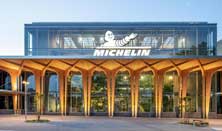Come 2026, automotive major Stellantis NV will pull out from a joint venture hydrogen-vehicle project with French tyre maker Michelin and automotive parts supplier Forvia SE as Stellantis cuts its exposure to the fledgling technology, putting the project’s future at risk.
The maker of Fiat cars plans to stop investing in the business known as Symbio that specialises in hydrogen fuel cells by 2026, Forvia and Michelin said.
“Forvia confirms it has been made aware of Stellantis’ intention to stop its investments in hydrogen from 2026, including in Symbio,” the auto parts maker said. The move “has serious and immediate operational and financial consequences for Symbio’s future.”
In a joint statement issued, Forvia and Michelin said they were informed in May of Stellantis’ intention to halt its hydrogen-related activities as of 2026. This unexpected shift comes despite Stellantis being both a co-shareholder and Symbio’s main customer, having long carried the ambition of shaping the hydrogen mobility market for light commercial vehicles.
Stellantis’ orders alone account for approximately 80% of Symbio’s planned production volume. Stellantis, which is trying to improve sales in Europe and the US after a challenging period, bought a 33.3% stake in the company two years ago to bolster its hydrogen-van offering.
The statement added, “Over the past two years, Symbio has scaled its investments, hiring, and development roadmap based on Stellantis’ stated needs for the next eight years. The technology and performance of Symbio’s systems have been validated by all shareholders, including Stellantis’ own teams. More recently, as part of the French government’s call for projects* announced in April 2025, Symbio was fully prepared to produce hydrogen fuel cells for Stellantis vehicles eligible under this scheme.”
The firms add that Stellantis’ decision will have irreversible operational and financial consequences for Symbio, with Michelin and Forvia “particularly concerned about the impact on Symbio’s 590 employees in France and 50 employees abroad”.
In this context, Michelin and Forvia are in close contact with public authorities, the firms added.
Hydrogen-mobility companies have struggled to scale up due to the fuel’s high cost, lack of standardisation and sparse infrastructure. Battery-electric drivetrains have become the leading alternative to gasoline and diesel engines for vans and passenger cars.

